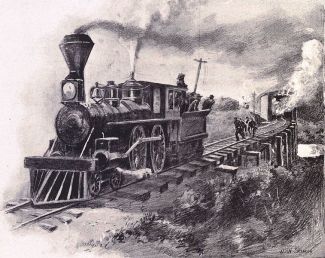 A civilian scout and a handful of volunteer Union soldiers from Ohio have devised a plan to cut off Chattanooga, Tennessee, from the city of Atlanta, Georgia. Chattanooga, a strategic water and rail center of the South, is a prize sought by Union forces.
A civilian scout and a handful of volunteer Union soldiers from Ohio have devised a plan to cut off Chattanooga, Tennessee, from the city of Atlanta, Georgia. Chattanooga, a strategic water and rail center of the South, is a prize sought by Union forces.
Today, the Union raiders put their plan into action. Having slipped into Georgia, they hijack the southern locomotive General and several rail cars at Big Shanty, Georgia (present day Kennesaw). Their plan is to drive the train north toward Chattanooga; destroy the track, sabotage switches, burn covered bridges, and send false telegraph messages along the way; and then meet an advancing Union army.
A chase ensues, as the train’s conductor and a handful of men, later joined by Confederate soldiers, pursue the stolen General, pursuing close enough to prohibit the Union raiders from doing as much damage as they had hoped. Just north of Ringgold, the General runs out of fuel, and the raiders scatter but are soon captured.
A young Baptist boy living near Ringgold, Georgia, witnesses what becomes known as the Great Locomotive Chase. General Winfield Scott Ware, born in 1854, claims a Baptist lineage on both sides of his family. After the war, he becomes a Baptist preacher and pastor in Florida.
Years after the event, Ware recounts what happened that day:
“Another early morning hour, I heard and then saw an engine pulling two box cars, coming around the curve and rushing through the valley at terrific speed. Then at a distance another engine with one flat car loaded with soldiers, yelling like Indians. Then another like train and others until 3 or 4 went screaming by. I knew something was wrong and soon knew the cause. … The yankee spies (he later identified them as from Resaca, GA) … saw a train crew leave their train for breakfast. So they eased on and pulled the throttle open for Chattanooga. Out a piece they stopped, cut the telegraph wire and dropped a box car. Now stealing a train from its crew was something new in Ga. They had no presidents (precedence) to go by, but they fell over themselves to make one for others …. The train crew got the first engine they could get, and set out in hot pursuit to catch those yanks and save their own faces, in such a slick trick. Soon they had to slow down, to ease up, to push a freight car, in front, which made it dangerous to go at high speed, but more dangerous to let those yanks escape. They caught them at Graysville near Chattanooga. They had used everything that would burn to keep up steam, but failed. Had they had wood and water, they would have been wrecked for a switch was open ahead of them. Reports cam concerning those men that they were of good character – well educated, of good families – and sympathy went out and regrets that they threw their lives away on a fool’s errand.”
Source: Ware quote (link); Great Locomotive Chase (link)
Note: This entry is co-authored with Arlette Copeland of Mercer University’s Jack Tarver Library’s Special Collections.


